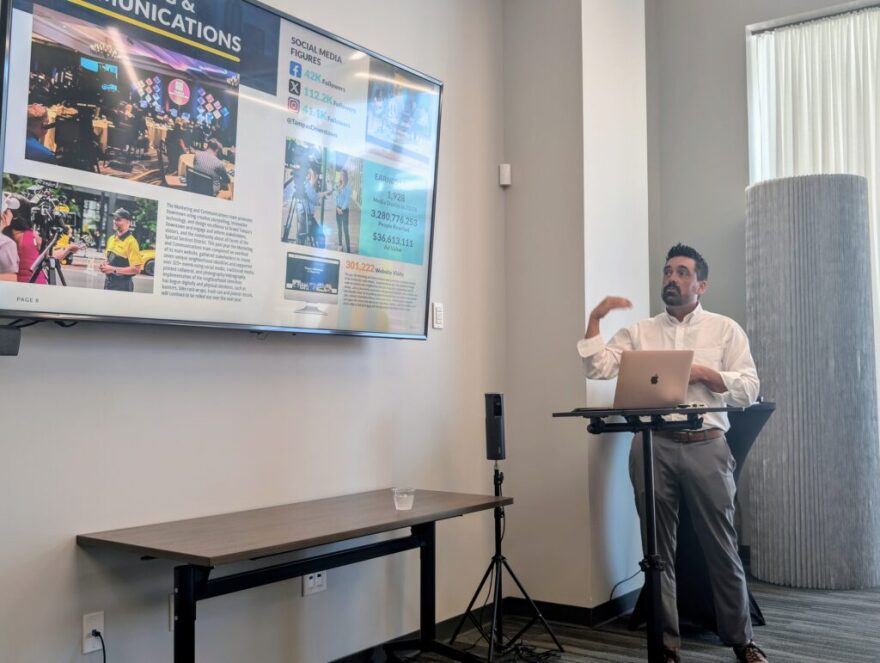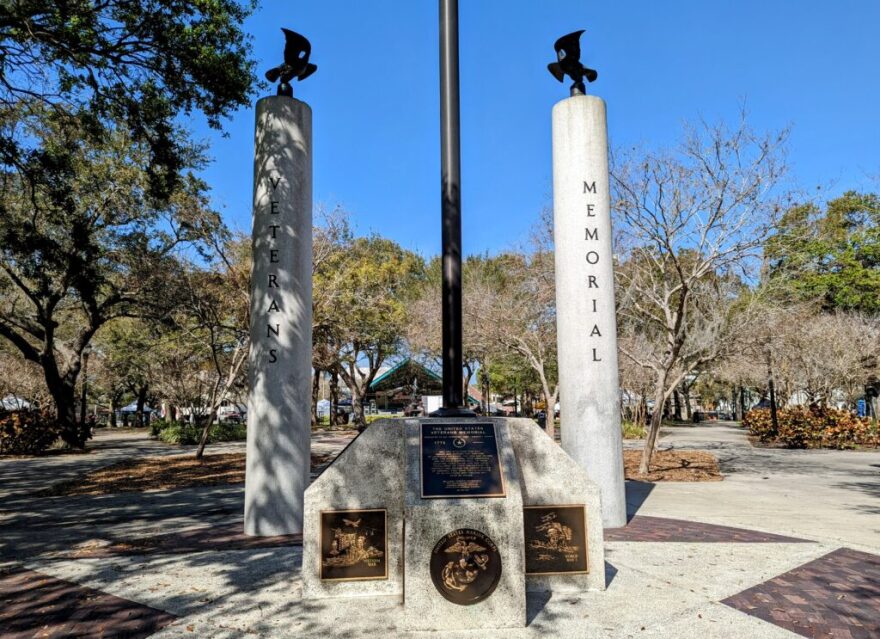New funding and leadership will propel long-discussed efforts to upgrade Williams Park and establish a St. Petersburg Downtown Improvement District.
A nonprofit group recently secured $800,000 in state funding to enhance St. Petersburg’s first park, which opened in 1888. The city has already allocated $1.2 million to repair its iconic bandshell, designed by renowned architect William B. Harvard in the early 1950s.
Those efforts intertwine with the St. Petersburg Downtown Partnership’s plans to develop a “Clean and Safe” urban management program. Shaun Drinkard, who previously served as Senior Vice President of Public Programming and Operations for the Tampa Downtown Partnership, will oversee the local initiative.
Drinkard is now vice president of the St. Petersburg partnership and will lead the implementation of a downtown improvement district. He said the $800,000 is “specifically for infrastructure improvements,” and cannot help fund the Clean and Safe program.
“There are layers to the Clean and Safe program that would absolutely touch the long-term success of the park,” Drinkard explained. “We’re looking at power improvements, lighting improvements, landscape enhancements – creation of rooms, I think, is a really big thing.”
Certain areas within Williams Park are more suitable for specific activities than others. For example, Drinkard said there are logical spaces for an instructor to host a class that requires electrical outlets.
“It’s just those little nuances of the infrastructure that are important,” he added. “Then we can simply plug in all these different programmatic elements.”

Councilmember Gina Driscoll represents the area and expressed gratitude for the partnership securing additional funding for Williams Park. “This is the boost we needed to make the park more functional for events that bring our community together,” she said.
The Williams Park Partnership, a nonprofit formed in 2016, requested the state funding. Its proposal notes that the state’s support will bolster safety, security and “pedestrian corridors.”
Jason Mathis, CEO of the downtown partnership, applied on behalf of the nonprofit. Drinkard said the two organizations are separate entities working towards the same goals.
The city should commence the previously estimated $1.95 million project by the end of the year. Repairs and upgrades would accommodate more performances and events while preparing the facility for historic designation, officials said in January 2023.
Aligning efforts is paramount. A city spokesperson said administrators are in “early discussion with the downtown partnership and look forward to continued collaboration to revitalize this key community asset.”
Stakeholders plan to establish weekly, monthly, quarterly and annual programming. “For a park like this, like an urban town square, we need those recurring activities that people will go to every week,” Drinkard said.
Activations will likely include cultural and culinary-focused events and recreational classes. The overarching goal is for the park to become a “front lawn” for all residents, regardless of their housing situation.
Drinkard will draw from his experience revitalizing Tampa’s Curtis Hixon Park. He and other stakeholders believe activating Williams Park will foster a sense of community ownership, which in turn promotes cleanliness and safety.
“When you just have something that looks really pretty with no purpose, then it’s hard to say what’s going to happen,” Drinkard said.

An improvement district
The improvement district will support the Clean and Safe Program. Drinkard has lived in St. Petersburg for the past 20 years and played a pivotal role in establishing and growing Tampa’s nationally recognized initiative.
He now eagerly anticipates applying that experience “to where I call home.” Driscoll said the initiative would address critical needs “the St. Pete way.”
“When you look at the success of Tampa’s Downtown Improvement District today, it comes down to the passion and expertise of one person: Shaun Drinkard,” Driscoll added. “Shaun is bringing the experience and knowledge base we need to take the (St. Petersburg) Downtown Partnership’s work to the next level.”
Drinkard credited St. Petersburg’s downtown waterfront park system, the St. Pete Pier and the city’s ability to attract and host myriad signature events. The improvement district and Clean and Safe initiative will cover the sometimes overlooked “basic, simple elements of a growing city.”
“There’s a need for a connector and the knowledge for the in-betweens,” Drinkard said. “We have amazing development taking place, and great infrastructure within the pedestrian spaces, but there are always those little gaps.”
He believes the “critical eye” of an urbanist will notice when a block is missing a garbage can or a high-traffic area requires additional cleaning. “You have a lot of stakeholders within a tight space, and there needs to be a common voice to ensure continuity,” Drinkard added.
The initiative’s supporters must still discern funding mechanisms. They have discussed using municipal parking proceeds and Intown Community Redevelopment Area tax revenue to establish the roughly $1.5 million annual budget needed for a successful launch.
Tampa has about 30 employees covering 1,100 acres, and a $6.6 million budget. St. Petersburg’s district would initially encompass 200 to 300 acres.
“But with that scale comes the ability to focus on a lot of detail,” Drinkard said. “From the waterfront to Williams Park … we can ensure we’re giving a lot of very high-quality attention, block by block.”
This content provided in partnership with StPeteCatalyst.com



